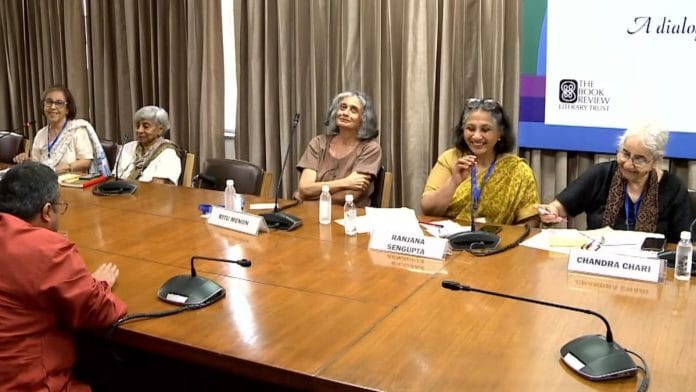New Delhi: In the 1990s, when Chitra Narayanan was a young journalist at Business Standard, her newspaper carried a book review section on its back page every single day. It wasn’t easy filling that space up.
“Imagine at that point of time, this was pre-email, it was my job to physically take books to reviewers, hand them over, and then collect it after 10 days,” said Chitra Narayanan, at a recent roundtable of The Book Review Literary Trust on The Role Reviews Play, chaired by author Ranjana Sengupta. It was part of the organisation’s 50th anniversary celebrations.
Narayanan, now at The Hindu BusinessLine, recalled how she and her team identified the best reviewer. It was time consuming, and reviews were taken seriously. However, that culture seems to have disappeared, she lamented.
At the India International Centre on 22 August, a long table was stretched across the front, where writers, publishers, and critics sat shoulder to shoulder — most of them old, having spent decades in the publishing industry and in the world of books. A row of listeners sat facing them.
The discussion brought several voices together, including author Malavika Karlekar, author Maya Joshi, and writer and publisher Ritu Menon. Along with them, were Narayanan, social worker and designer Laila Tyabji, Ashoka University professor Malavika Maheshwari, poet and professor at IIT Delhi Rukmini Bhaya Nair, and Sucharita Sengupta, an assistant professor at Jamia Millia Islamia.
At a time when the publishing industry is expanding, with self-publishing and AI-driven publishing taking over, the session asked an important question: What place do book reviews hold in India’s literary landscape today?
It was less like a roundtable and more like an “adda”, with microphones, AC, and plastic water bottles.
The question over shrinking spaces was picked up by Rukmini Bhaya Nair as she leaned back and spoke in a low, soft voice.
“Reviews are as much about the reviewer, as about the book,” she said. Even silence, Nair added, is a review in itself. Choosing not to write is also a statement. For her, even as the space for book reviews has shrunk, the need for them hasn’t.
Other speakers too weighed in. Ritu Menon was fiery. She reminded the room that there exists a gender bias in reviews — men get more space and visibility than women.
“Manu Pillai would get more space than Malvika Karlerkar,” Menon said, with a straight face. The room laughed. A few had their eyes open wide, while some smirked as they agreed.
For Malvika Maheshwari, a book review opens up a conversation, not only about the story, but about different ideas. The speakers argued why it is important to ask some questions: Are book reviews important? Who are we writing for? The author, the book, or myself?
Also read: J&K oral histories counter popular perceptions about the region. They also have dark humour
‘A new world’
Even as spaces given to book reviews are shrinking, book clubs and online communities have become the new gatekeepers of the book review industry. They are diverse, both Chitra Narayanan and Sucharita Sengupta pointed out.
“Amazon reviews can push a book to the top of the charts, algorithms play an important role now, and reviews can be fed,” Narayanan said, leaving the room wondering. Many nodded their heads in agreement.
“A new world is opening for first generation scholars, and books and book reviews are the entry points,” she added.
As the crowd started to thin, questions were asked about physical books losing relevance, since online books are becoming more popular. Some questions highlighted how book sellers aren’t aware of different genres of books — some of them are just doing business.
The speakers also shared nostalgic memories of visiting iconic book shops. They told stories of their favourite “book guide” who always knew when a new book was arriving.
And then, as the conversation grew, the line that remained stuck to most people, and the one that received most claps, was: “As long as people can think, they will want books,” Laila Tyabji said, smiling. It cut through the anxieties about social media algorithms and shrinking space in newspaper columns. She was assertive, and calming.
(Edited by Aamaan Alam Khan)






